When attending school in Mallorca, various options are available. In addition to public schools, there are private institutions, international schools, and schools with private funding that receive state subsidies. Except for international schools, which follow the curricula of other countries, all Spanish students go through multiple cycles and receive more report cards than children and parents might find necessary. Until my first son started school, I knew little about the Spanish education system. To make it easier for other parents, I’ll provide a brief overview here.
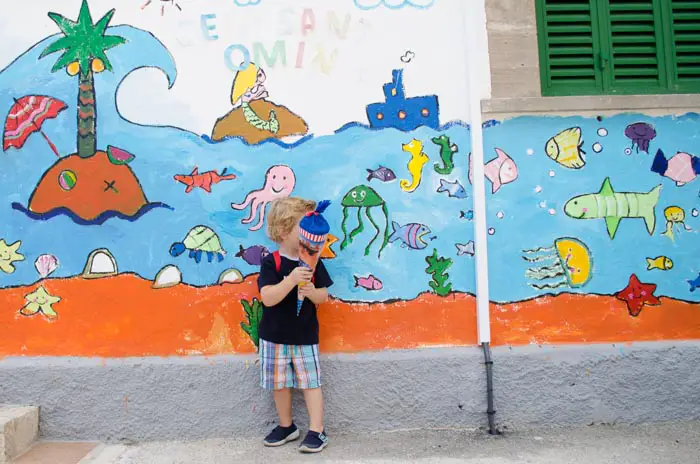
Transparency note: Some links in this post may lead to external booking opportunities. If a purchase is made, we receive a small commission. The price does not change for you.
This post is suitable for anyone looking to learn more about the Mallorcan school system, whether they are considering sending a child to school in Mallorca or simply out of curiosity. Choosing the right school in Mallorca is no easy task, but that’s likely the case in any country. After all, it concerns the foundation of our children’s education, which can influence their entire lives. I’ll incorporate a lot of factual knowledge into this post but will also interject my own opinions. These, of course, are purely subjective. Just a heads up: The Spanish education system has its flaws, but it’s much better than its reputation!
- Current Updates on Schools in Mallorca
- Compulsory School Attendance & Residence Outside Spain
- Enrollment in School on Mallorca
- Public and Private Schools in Mallorca
- International Schools in Mallorca
- Are Private or International Schools better?
- The agony of choice: Village or City?
- The Spanish School System
- Read More
Current Updates on Schools in Mallorca
For children aged 0 to 3 years: Starting from September 1, 2023, all public childcare places will be free of charge. There are a total of 198 facilities on the island.
School year 2023/24: The enrollment process for children in the state school system takes place from May 8 to May 15, 2023. Here, you can find all the essential information. Enrollment is also possible online.
Even after the enrollment deadline has passed, it is still possible to register children until the start of the school year and even beyond. The only challenge might be with a preferred school in Palma. In principle, every child registered in Mallorca is entitled to a school place. The question is only where there is availability. The school authority is closed in August. Inquiries can be made directly there until July and from September onwards.
Compulsory School Attendance & Residence Outside Spain
Your children are supposed to attend a school wherever they are officially registered as residents. To enroll children in school on Mallorca, they must be registered with their primary residence on the island. If you have a second residence without residency status, obtaining a registration certificate becomes challenging, and without it, enrollment in school is almost impossible.
A crucial aspect, especially for Germans, is the question of child benefit. In Spain, this benefit does not exist. Typically, within the countries of the European Union that do have this aid, you only receive it in your home country if your children are officially residing. That means, they must spend at least 145 days a year in the home country to maintain this status. Once they start school on Mallorca, the entitlement to child benefit is forfeited.
Enrollment in School on Mallorca
Unlike in Germany, there is no fixed enrollment date for children registering for school in Mallorca. What matters here is the birth year. That means, all children born in 2018 will enter the first grade of elementary school in September 2024, regardless of whether they are still five, already six, or soon to be seven years old.
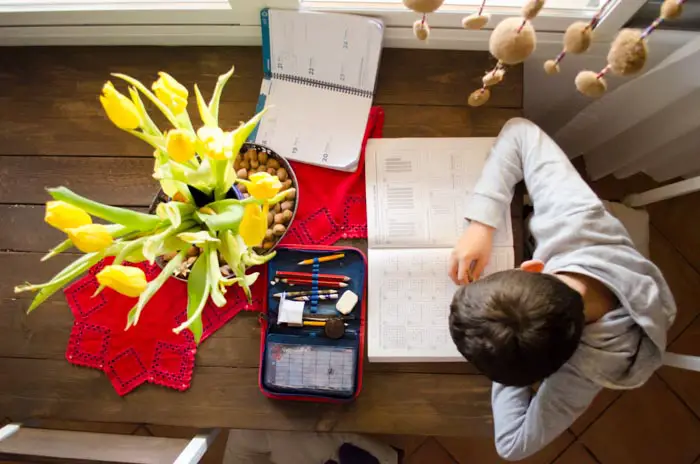
However, there was previously a deadline, which also applies to enrollment in infantíl, the preschool level. It runs each year from the end of March to the beginning of April, depending on the exact start of the school year. Admission can be a bit more involved in cities like Palma compared to villages, where schools typically have available spots and accept all children. In urban areas, a point system is used to allocate spaces, taking into account the residence, parents’ workplaces, and siblings at the school.
Public and Private Schools in Mallorca
In addition to public and private schools, there is a third form in Mallorca known as concertados. These are private institutions, often affiliated with religious entities, that receive subsidies from public funds. Only at public schools, including preschool, is education free for all. Typically, a modest amount is paid at the beginning of the school year to cover material costs for copies and similar expenses.
Until a few years ago, there was significant frustration because new textbooks had to be purchased every year. Since new, revised editions are released each school year, it was challenging to pass on books from one year to the next. However, in recent years, at least some schools – including ours – offer the option to borrow textbooks from the school for a significantly lower fee. This is a very positive development in terms of waste reduction and resource conservation.
International Schools in Mallorca
Many expats, especially those with a foreseeable limited stay in Mallorca, prefer one of the international schools on the island for their children. These schools tailor their offerings to the needs of international students. The primary language of instruction can be English, French, German, or Swedish. Class sizes are smaller, and the teaching staff is internationally recognized. The learning environment in international schools in Mallorca is multicultural, providing students with a solid foundation for further studies in other European countries.
The diplomas from international schools in Mallorca are recognized by both Spanish schools and all European universities, except for the British A-Levels. Since international schools in Mallorca admit only a limited number of students, there are usually waiting lists and often entrance exams. Interested parents must initiate the enrollment process as early as possible to ensure a timely start to the school year.
- Eurocampus Deutsche Schule Mallorca: Together with the Scandinavian School, the Deutsche Schule Mallorca forms the Eurocampus. Both schools have approximately 100 students who are taught together in some subjects. Instruction is in German, English, Spanish, Catalan, and French. Deutsche Schule Mallorca
- Svenska Skolan Mallorca: The Svenska Skolan is subsidized by the Swedish government and teaches all age groups, including a kindergarten. The languages of instruction are Swedish, Norwegian, English, and Spanish. www.svenskaskolanmallorca.com
- Agora Portals International School: Established in 2008, Agora Portals is one of the most popular international schools among Spanish parents. It educates 1,400 students up to 18 years old. While the main languages are Spanish and English, the school also offers French, German, Catalan, and Mandarin. Unlike other international schools in Mallorca, Agora Portals provides childcare for babies and toddlers aged 0 to three years. http://colegioportals.es/
- Raoul Wallenberg International School: Located in a historic estate in La Vileta, Palma, built in 1929 and formerly owned by the Vatican, the school plans to renovate the building for educational use starting in September 2024. The school will feature spacious outdoor areas for play, sports, and activities, including football, beach volleyball, and basketball. The facility includes around 20 classrooms, administrative offices, a kitchen, a dining room with a terrace, a chapel as a school auditorium, and a science block with laboratories. https://www.rwiss.eu/
- Bellver International College: Located in Cala Major, a suburb of Palma, Bellver International College is considered the oldest British private school in Spain. It follows the curriculum of the British school system and admits around 320 students aged three to 18. Entrance exams in English and other subjects are required from the age of six. The languages of instruction are English and Spanish. www.bellvercollege.com
- Green Valley School – Palma: Established in 2017, the Green Valley School is an international full-day school teaching according to the British education system. It offers the International Baccalaureate (IB) as its graduation, which is internationally recognized. The school is housed in an old mansion in a suburb of Palma and follows Montessori methods in its curriculum. Instruction is in English and Spanish, with a capacity for approximately 200 students. A basic understanding of English is required for admission. www.greenvalleyschool.es
- Baleares International College: Founded in 1957 as an independent full-day school, Baleares International College educates approximately 290 students between the ages of two and 18. The language of instruction is English, with teachers being native speakers, and other languages such as Spanish, French, and German are also offered. The institution has modern sports facilities, including a swimming pool and various sports fields. Basic knowledge of English is required for admission. www.balearesint.net
- King Richard III College American International School: King Richard II College is an independent full-day school offering education up to the 13th grade. The languages of instruction are English and Spanish, and the school admits 270 children between the ages of three and 18. An admission test in English and mathematics is required. www.kingrichardcollege.com
- Queen’s College, Mallorca: Queens College educates children aged three to 18, leading to the English A-level or equivalent Spanish qualifications. The languages of instruction are English, Spanish, French, German, and Catalan. The school can admit up to 350 students, with a prerequisite of basic knowledge of English. http://www.queenscollege.es
- The Academy: Founded in 1985, The Academy teaches around 200 students aged three to 14. Languages of instruction include English, Spanish, Catalan, and German. Placement tests are necessary. www.theacademyschool.com
- Colegio Francés de Palma: The Colegio Francés is the only French private school in Mallorca. It follows the French curriculum but also prepares students for Spanish universities. The language of instruction is French, with additional teaching in Spanish, Catalan, and English. Approximately 400 students can be accommodated, and knowledge of the French language is required. https://ifpalma.es
- Rafael Nadal International School (RNIS): Mallorca’s most famous tennis player, Rafael Nadal, has not only established a tennis academy and the interactive Rafa Nadal Museum XPerience in his hometown of Manacor but also founded a private school. The Rafa Nadal International School (RNIS) follows the American credit system, providing education for children aged 6 to 18. A suitability test is required for admission. www.rafanadalschool.com
- Tudor Rose College: Tudor Rose College is an English international school and one of the few international schools in eastern Mallorca. The school follows the Cambridge International Curriculum, providing education for children aged 1 to 12 in the Primary and Middle School cycles. bbcollege.com
- Montessori School of Mallorca: The Montessori School of Mallorca offers an alternative education for parents and children aged three to 16. The school follows the National Curriculum of England, incorporating instruction in English, Spanish, and Catalan. www.montessorimallorca.org
- Tri Vives International School: Tri Vives International School in Mallorca provides trilingual education in German, English, and Spanish. With small class sizes, a maximum of 12 students per class, the school emphasizes a quiet learning environment. The focus is on playful learning without pressure, highlighting the talents and abilities of each student. The school is located near Santa Maria del Camí. trivives.com
- Waldorfschule Escolasofia in Palma: Though not strictly international, Waldorfschule Escolasofia in the industrial area of Son Rossinyol in Palma is an initiative by parents and teachers seeking to educate their children based on the principles of Waldorf Steiner. The school is officially recognized by the Balearic government and follows the Spanish curriculum. It encompasses preschool, primary school, and secondary school. waldorfpalma.com/
Are Private or International Schools better?
Deciding whether private or international schools are worth it depends on your expectations and circumstances. If there’s uncertainty about your children spending their entire school time in Mallorca, choosing an international school that follows German or British curricula might be more sensible.
Spanish private schools don’t differ significantly from public schools, except for the use of school uniforms and higher costs. Families we know who send their children to private schools base this decision more on the extended care hours until 5 PM than on the presumed higher quality of education.
Most private schools in Mallorca follow the Spanish curriculum. This means that Catalan is the second official language and is used at least 50%, often more. While some claim that in private and concertado schools, Spanish and Catalan are each taught for 50%, we can’t confirm this universally from our own experiences.
The agony of choice: Village or City?
In urban areas, you’ll find a greater variety of educational institutions. International schools are only available in Palma and some locations in the east of Mallorca. Public schools are accessible through a points system, considering parents’ work, residence, and siblings. However, there is no guarantee of free choice.
Opting for a school in a rural area (subjectively from our experience) has the advantage of making it easier to connect with others than in urban settings. Additionally, public schools in rural areas tend to be more open to alternative educational approaches. We know of several institutions that follow the principles of free schools or Montessori, all without the high fees associated with private schools.
Small request: I often receive messages from parents at this point, asking me where exactly these schools with alternative approaches are. They are small, located in rural areas, and I only know about them because other parents share their experiences. I kindly ask not to mention them publicly, as an influx of expat families might take away spots from local children. Feel free to ask for recommendations from other parents in the comments or in the Facebook group. However, I won’t mention specific names at this point.
An important and positive distinction of Spanish schools compared to German ones, in my view, is their inclusive nature. There is comprehensive support for children with special needs, ranging from accompanying school staff, speech therapists, and school psychologists to technical aids. Even students who cannot follow regular classes participate in mainstream education, at least in elementary school. In this setting, they are given small tasks, emphasizing the idea that everyone knows something and can learn from others.
The Spanish School System
Before embarking on the children’s school journey, it’s important to know a few things. For instance, maternity leave in Spain lasts only 16 weeks, which is not even four months. Yeah, I know, there are countries with less, but coming from Germany myself with significantly more time, that is quite a bummer. But it is the way it is, so most mothers on Mallorca return to work, and their children often start attending daycare.
Daycare & Kindergarten (0 – 3)
What is referred to as kindergarten or daycare is the first cycle of public education in Spain, called educación infantil. These facilities are commonly known as escoleta (small school) or guardería (daycare) and can be affiliated with a public school or privately operated.
As of 2022, there was already an opportunity to place children aged 1 and above for free in these public childcare centers. Since September 2023, childcare is now also free for children from 0 years old. This means there are more than 11,000 free childcare spots across almost 200 facilities. You can find all public childcare facilities here.
Since there are few alternatives, it’s relatively common for young children to be in external care. However, many guarderías require, for autonomy and logistical reasons, that children can walk. The caregiver-to-child ratio in the facilities we are familiar with is one to five.
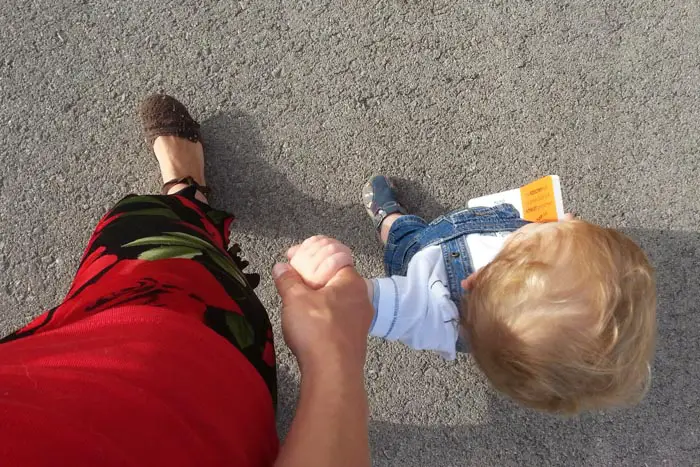
The hours of care vary but generally range from around 8:30 AM to approximately 1:30 PM. Additional care from 7 AM to 5 PM is possible but comes at an extra cost.
The concept of a day-care mother is not widely known in Mallorca. Those who can afford it may employ a babysitter, au pair, or nanny. In the most economical cases, where students or individuals looking to earn extra income, this assistance might cost between 10 to 15 euros per hour. If this service is received regularly, the respective person must be legally insured, significantly increasing the costs. For legally secure employment contracts and information, you can consult any “Gestoria.” If you only need occasional care, you can find help at www.mallorcanannies.com. The nannies offer hourly care for your children, including overnight if necessary.
Preschool (3-6)
Around the age of 3, children transition into the second cycle of educación infantil. For many, this marks the beginning of a more serious educational phase. Although the system is slowly evolving, it is still common for learning letters and numbers to commence at this age. Ideally, according to one of my children’s teachers, students entering primary school should already be capable of reading and writing. This early emphasis on literacy is similar to educational practices in other countries, such as the United States.
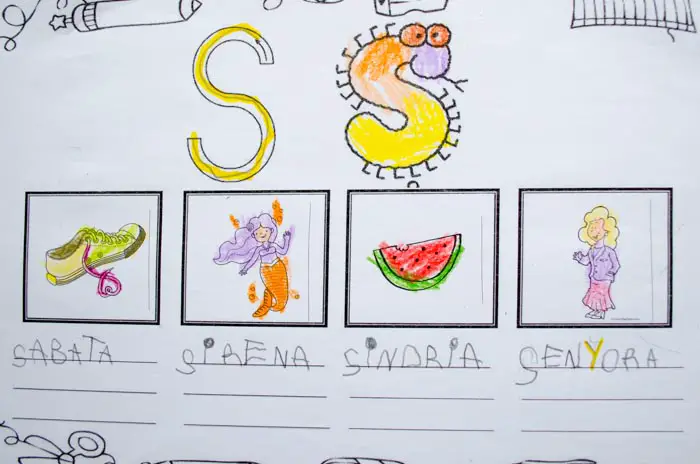
Participation in this cycle is not mandatory; however, it’s rare for children not to attend preschool. This is due, in part, to the need for childcare while parents work, and also because many parents still fear their children might be at a disadvantage if they don’t attend preschool and enter primary school without knowing how to read and write.
As mentioned earlier, the system is evolving, and there are now many preschools adopting other teaching methods. This approach draws inspiration from Montessori methods, providing children with more freedom and allowing them to decide what and when they want to learn. One example is the Ses Milanes Forest Kindergarten in Bunyola, but note that there are often long waiting lists for enrollment.
Primary School (6 – 12)
Now begins the compulsory part of education, covering a total of ten school years. The school day typically starts around 8:30 AM at regular public schools and ends around 1:30 PM. Private and publicly funded schools have a lunch break, which can be spent at school or at home. Afternoons typically continue until around 5 PM.
In primary school, known as primaria, children spend six years, further divided into three cycles: the first, second, and third cycles, each lasting two years. An important note is that students can only repeat a grade once within a cycle.
Bilingual School System
And while we’re navigating through the linguistic maze, it’s essential to note that all schools in Mallorca offer instruction in at least two languages. This is because, on the island, alongside Spanish, Catalan is an official language. According to a law, it must be used in all public areas at a minimum of 50 percent. I’ve written more about the languages spoken in Mallorca here.
At this point, families planning to move to Mallorca often ask whether their children should already learn Spanish in Germany. Once on the island, schools provide specialized teachers to help children quickly integrate. Anything they already know will expedite their adjustment. It’s advisable to find a language exchange partner to engage in conversation, focusing more on understanding and speaking rather than grammar, at least initially.
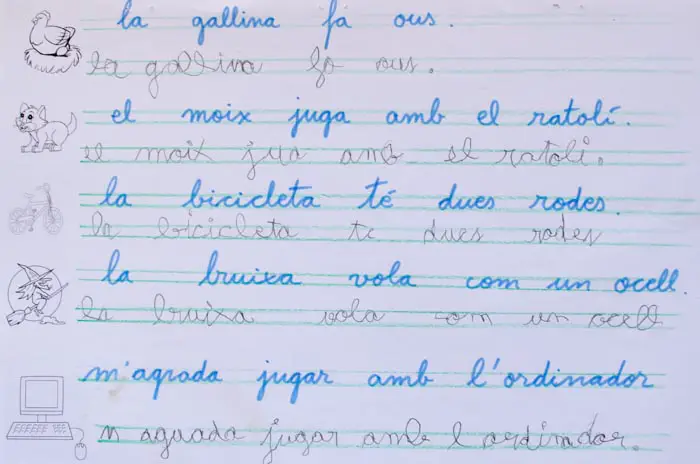
In reality, however, Catalan predominates in schools, largely due to a strong pro-Catalan lobby within the Ministry of Education. For those thinking this might be a reason to opt for private schools: even there, this law applies.
Depending on the extent to which Catalan is taught, non-Spanish children may learn only limited Spanish in Mallorcan schools. At least not to the extent that parents in these cases often anticipate.
Language Barriers for Foreign Children
I am often asked by my readers how quickly children adapt to the new language. In general, the younger the children, the easier it is for them. It is always helpful to learn the language beforehand, even if it is only Spanish and not Catalan.
In public schools, there is also supportive staff who individually care for newcomers. This means that children receive one-on-one instruction in the first few weeks to learn Catalan until they can follow classes without assistance. Typically, this happens after a few weeks.
Middle School (12-16)
After the sixth grade, students move on to the instituto, the middle school. Colloquially often referred to as E.S.O. (Educación Secundaria Obligatoria). At the end of this stage, there are exams that lead to the first official school certificate, the Título Graduado E.S.O. The daily classes are a bit longer here, from around 8 am to 2 pm.
Unlike the German system, the classes in middle school are not numbered further. So instead of 7th, 8th, 9th, and 10th grade, students start again with 1st, 2nd, 3rd, and 4th.
Grades, Reports, and Vacations
If the report card distribution stressed you out as much as it did for me, let me tell you: here in Mallorca, it happens three times a school year. That’s because the academic year is divided into trimesters. This means that every three months, there’s an assessment of the school. If the math doesn’t quite add up for you because three times three is only nine, then you should know that in Spain, there are three months of summer vacation. No typo: from mid-June to mid-September, students in Mallorca don’t go to school. From a child’s perspective, it’s fantastic. From a parent’s point of view, … let’s not talk about it. At least, we’re spared another report card. The preschoolers in the second cycle of infantil also have holidays.
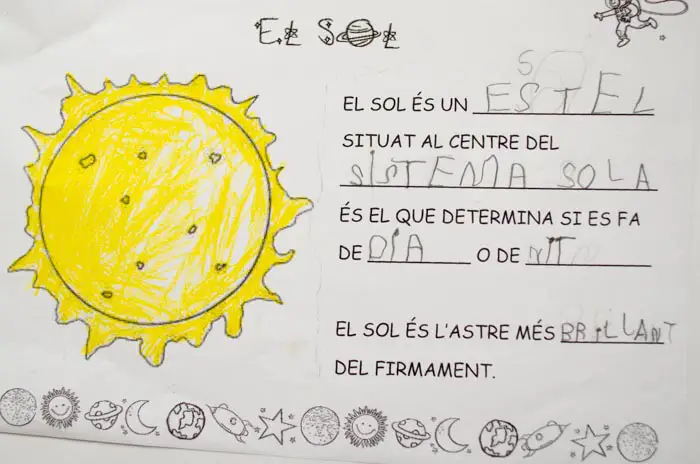
The assessment of learning performance begins even in preschool, also occurring at three-month intervals. However, it’s only from elementary school onward that actual grades are given. These grades, though, don’t range from 1 to 6 like in Germany; instead, they span from 0 to 10. In this system, zero is the lowest grade, and 10 is the highest. So, if a Mallorcan student brings home a 6, they rarely get into trouble because that puts them right in the average range, similar to a German 3. With a 5, they just manage to meet the class objective. If they have several subjects with a grade lower than 5 on the report card, they have to repeat the grade.
Three Months of Vacation
How do we survive them? With plenty of sun and swimming. Every family organizes things differently. Particularly, Mallorcan families are highly interconnected, and it’s widespread for grandparents, uncles, and aunts to share childcare responsibilities. Additionally, there’s the so-called summer school, “escoleta de verano,” which is more amusing than its name might suggest. Regular classes don’t take place there. Instead, there are many activities, excursions, and creative sessions.
To the dismay of parents working as seasonal workers, this care does come at a cost (approximately the same as a daycare) and is only available from Monday to Friday. In our specific family situation, the summer school hasn’t been beneficial for us so far. And since our kids aren’t bored to death at home, we have, for the most part, refrained from using it, except for one summer.
Special summer care programs are also offered by all major recreational centers. For example, there’s a specific summer school at Palma Aquarium, where children get early access before regular visitor hours and assist in feeding the animals.
High School Diploma
After completing middle school, there’s still further education available. In high school, known as bachillerato, students can work towards their high school diploma, título de bachiller, in two school years corresponding to the 11th and 12th grades. This qualification has nothing to do with the university Bachelor’s degree. In the upper level, students can choose from three major areas: natural sciences, social sciences, or arts.
If students pass the exam at the end of the two years, they receive the título de bachiller. With this diploma, they can either pursue another qualification in vocational training or continue to university. However, to be admitted to a university, another exam must be taken. This exam, colloquially called selectividad, always takes place in June, and its results are factored in with those from middle school.
Vocational Training Path
Instead of aiming for the High School Diploma, many students also pursue a qualification in a vocational field (título de técnico). As my children are still quite a way from this stage, I can’t share personal experiences here. However, I can mention that in various cycles, students can specialize in more than 100 areas.
The basic training lasts for two years and, through internships, leads to the grado medio. This can then be complemented with the grado superior, which high school graduates can pursue after their diploma instead of a university education.
University
In Mallorca, there is a public university with branches in Menorca and Ibiza. Across six faculties, they offer more than 50 degree programs. The main branches of study include natural and educational sciences, medicine, and tourism.
Read More
Want more recommendations like this? Check out more than 100 day trips and excursions on Mallorca.
Planning your holiday on Mallorca:
Book your Flight here
Great Rental Car Offers

